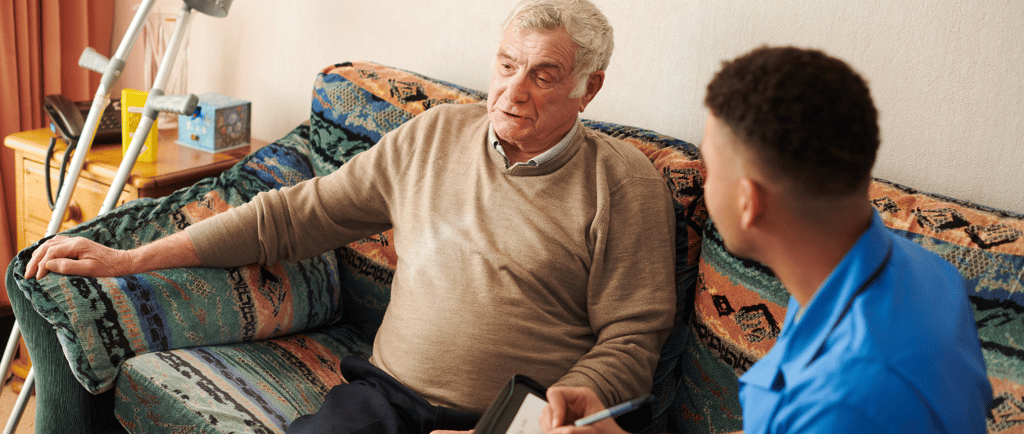When Home Becomes Hospice: Navigating End-of-Life Care with Dignity
Compassion at the Final Chapter Avanta Care offers dignified, compassionate end-of-life care within the comfort of home. From managing pain to offering emotional support, our caregivers guide families through this deeply personal journey. Home hospice isn’t about giving up—it’s about choosing peace, presence, and love during life’s final moments. We ensure that no one walks that path alone.
7/25/20255 min read


Understanding Home Hospice Care
Home hospice care exemplifies a compassionate approach to end-of-life situations, designed to support patients and families in the comfort of their own homes. Differing significantly from traditional hospital care, home hospice focuses on providing personalized medical attention, emotional support, and palliative services that aim to enhance the quality of life for individuals facing terminal illnesses. This model is grounded in the belief that patients fare better when surrounded by familiar environments and loved ones during their final days.
Key to home hospice care is the emphasis on dignity and comfort. Unlike the often impersonal settings of hospitals, home hospice fosters a serene atmosphere where families can engage openly, facilitating meaningful conversations and farewells. This setting not only allows for tailored care plans that align with the patient's preferences and values but also enables family members to participate actively in the caregiving process. The emotional well-being of both patients and their families is prioritized, as the familiar surroundings contribute to a greater sense of security and peace.
Additionally, studies suggest that patients receiving home hospice care often experience fewer symptoms of pain and anxiety compared to those in hospital settings. This therapeutic environment can lead to improved overall well-being by providing relief from the institutional constraints of hospitals. Families also benefit from the presence of skilled hospice professionals—nurses, counselors, and social workers—who are dedicated to offering support, guidance, and respite when needed.
Ultimately, home hospice care serves as a vital alternative to traditional medical care, ensuring that individuals can navigate their final journey with grace and dignity, surrounded by the love and support of those they cherish. This holistic approach not only honors the patient's wishes but also enriches the entire family's experience during an overwhelmingly challenging time.
The Role of Caregivers in End-of-Life Care
In home hospice settings, caregivers play an essential role in providing comprehensive care and support to terminally ill patients and their families. Their contributions extend beyond mere physical assistance; they are often the emotional backbone that sustains patients through their final days. Caregivers are trained to manage pain and medication, ensuring that the patient's comfort is prioritized without compromising their dignity. They are well-versed in recognizing signs of discomfort and can adapt quickly to changing needs, making them an invaluable asset in a home hospice environment.
Moreover, caregivers offer emotional support not only to patients but also to their families, providing a compassionate presence during a profoundly difficult time. They listen, provide comfort, and facilitate open conversations about fears and expectations. This dual support system strengthens the bond within families and allows for a more holistic approach to end-of-life care. The importance of skilled caregivers cannot be overstated, as they often become confidants for both the patient and their loved ones, helping to navigate the emotional labyrinth of grief and loss.
The training and qualities that effective caregivers possess significantly impact the overall experience of hospice care. A blend of compassion, patience, and resilience enables caregivers to provide sensitive support tailored to the unique circumstances of each patient. Personal anecdotes illustrate this profoundly; many families recount moments when caregivers became integral to their journey, providing not only medical assistance but also valuable life lessons about love, acceptance, and the importance of treasuring every moment.
In conclusion, caregivers are pivotal in home hospice care, offering essential physical and emotional support while fostering a caring environment. Their diverse responsibilities, combined with their inherent qualities, shape the experience of end-of-life care, ensuring that both patients and families navigate this challenging phase with dignity and comfort.
Navigating the Emotional Journey: Support for Families
The emotional landscape surrounding end-of-life care is often tumultuous for families. Grief, anticipatory loss, and the complexities of impending farewells can evoke profound feelings, leading individuals to seek emotional support in various forms. Understanding these emotions is crucial for families as they navigate this sensitive time together.
One of the key challenges faced by families is the multifaceted nature of grief. Each member may experience loss differently, and emotions can fluctuate significantly. This unpredictability can complicate family dynamics and communication. Therefore, establishing open lines of communication is essential. Encouraging family discussions about feelings, fears, and memories can foster a supportive environment, allowing everyone to express their emotions freely and share their unique experiences.
Additionally, anticipating loss can result in a range of emotions that can overwhelm family members. Anticipatory grief may manifest as sadness, anger, guilt, or even relief, making it important for families to be aware of these reactions. Seeking guidance from professional counseling services can provide effective coping strategies and a safe space to process these complex emotions. Many therapists specialize in grief and loss, offering tailored support that can assist families in navigating their personal emotional journeys.
Community resources also play a pivotal role in providing support. Local support groups offer families a chance to connect with others facing similar challenges, promoting a sense of camaraderie and understanding. Sharing experiences in a group setting can alleviate feelings of isolation, reinforcing the idea that families are not alone on this journey.
In essence, during the fragile phases of end-of-life care, it is crucial for families to prioritize emotional support. By embracing open communication, engaging with professionals, and utilizing community resources, families can find a pathway through the emotional complexities of grief and create a sense of dignity in the process.
Choosing Peace, Presence, and Love at Life’s End
The narrative surrounding end-of-life care and hospice can often carry a weight of sadness and resignation, suggesting that the end is merely an act of giving up. However, a reexamination of this perspective reveals that hospice care embodies the values of peace, presence, and love, fundamentally transforming the dying experience into a compassionate journey rather than a tragic conclusion. As more families opt for home hospice care, stories emerge that highlight the profound dignity afforded to individuals during their final days.
Consider the story of Sarah, who spent her last days in the comfort of her home, surrounded by her loved ones. With the assistance of hospice professionals, Sarah was able to maintain her dignity while receiving tailored support that prioritized her wishes and comfort. Her family reported a profound sense of peace as they gathered together, sharing stories and laughter, creating a presence that filled the air with love. In this intimate environment, the narrative shifted from one of loss to one celebrating life, connection, and the inevitability of death.
Similarly, John’s journey through hospice care illustrated the power of an empathetic approach during his final moments. With an emphasis on symptom management and emotional support, John found solace in the presence of his family, who were empowered to embrace this chapter together. By focusing on love and connection, the hospice care team fostered an environment where John felt free to express his thoughts, fears, and memories, thereby enhancing both his own experience and that of his family.
These stories exemplify the importance of redefining end-of-life experiences. Dying with dignity involves recognizing that hospice care is not solely about physical decline but rather about the holistic support that prioritizes emotional and spiritual well-being. As families embrace this compassionate journey, they find strength in peace, presence, and love, cultivating a legacy of connection that transforms the final chapter of life into a testament of shared humanity.


